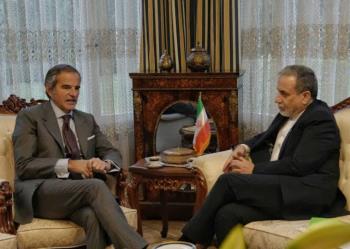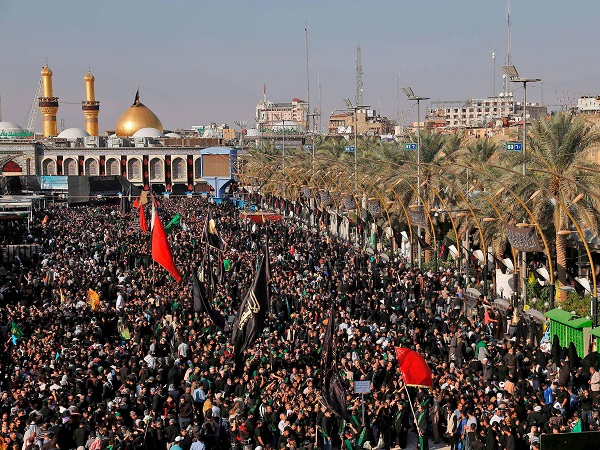Alwaght- Millions of Muslims, and also non-Muslims, are arriving in Iraq to mark Arbaeen of Imam Hussein ibn Ali.
The congregation, seen as the largest Muslim world exhibition of solidarity and unity, mourns the martyrdom of the grandson of Prophet Muhammad.
Millions of pilgrims from around the world march to the holy city of Kabala and hold the Ziyarah (pilgrimage) at the end of the 40-day mourning period following Ashura
The marches have started nearly two weeks ago and they will culminate on Saturday.
Men and women, young and old, toddlers in prams and elderly pushed in wheelchairs, are heading to commemorate Arbaeen.
The pilgrims stream past tents, or “mokebs”, which hand out free food ranging from scrambled eggs to boiled turnips. Full meals are served at midday and in the evenings, also freely.
In the day of Arbaeen, some 20 million people join the commemoration.
“I am marching to the holy Karbala because we love Imam Hussein (Peace Be Upon Him), a 40-year-old Iranian pilgrim, told Alwaght on Chazabeh border crossing with Iraq, adding “Imam Hussein (Peace Be Upon Him) was a free man, he revolted against the oppression, he chose the freedom. And that is what attracts us. This is inspiring for us Shiites.”
Another pilgrim, from Pakistan, told Alwaght that he came from the neighboring country because he thought that the trip is nice and worthy. “Imam Hussein sacrificed his life not just for the Muslims but also for the whole humanity. He was a man who paid the price of seeking the right course,” he said. “We hope we can be real followers to him,” he went on while stopping at a mokeb established by an Iranian voluntary group.
Mokebs are set up voluntarily by people whole believe that offering services to the pilgrims will help them go the Imam’s way and strengthen the brotherhood among the Muslims.
“We provide food, three meals a day, to the zaereen (pilgrims). We are proud of that. We think that will attract more pilgrims next year. This is a show of convergence of the Muslim world,” a volunteer at Mokeb owner told Alwaght.
Sayyed Hussein Javid, imam of a London mosque, commenting on Arabaeen, told Iran’s Fars News Agency last year that Muslims march due to the huge charisma of Imam Hussein. “The love to him is unique and indescribable,” he went on. He hailed the caravans of European pilgrims going to Karbala.
The Iranians account for the largest number of foreign nationals entering Iraq for the commemoration. The Iranian Foreign Ministry’s Visa Department has said that so far over 3 million visas were issued for Iranian nationals wishing to travel to Iraq.
Three border crossings with Iraq, Mehran, Chazabeh, and Shalamcheh, have been operating over the past two weeks to pass the travelers to Iraq. Since last week, they worked round the clock to provide service to all of the marchers.
Iran’s Khuzestan province governor Gholamreza Shariati on Friday visited Shalamcheh border to see how the arrangements are going. He told the media that Shalamcheh border crossing is the biggest and most equipped one of the three. “Over the past few days, a large number of foreign pilgrims entered Iraq through its gates,” he said, adding “Chazabeh and Shalamcheh border gates are operating round the clock and the visa holders can pass to Iraq any time, day and night.”
The Iraqi side also has been working fulltime to make sure that the fluxes of pilgrims are addressed.
In addition to food, a range of services are provided to the marchers. New highways were built to accommodate the increasing number of the pilgrims on both sides of the border. Free WiFi service is provided along the road. The mobile carriers and telecommunications companies from Iraq and Iran have been providing services. Telecommunication Company of Iran has said on Saturday that it reached an agreement with the Iraqi mobile operators for cheaper calling and texting services.
The event draws people from various countries. From the European countries, Azerbaijan, Turkey, Afghanistan, Pakistan, Armenia, Lebanon, Russia, and the US and many other countries. Many travel to Iran and walk to the holy city through the Iranian border crossings. Travelers from neighboring countries of Afghanistan, Pakistan, Azerbaijan, and Turkey have been arriving in Iran from the northwestern and eastern borders. Tabriz and Zahedan cities have been taking in the pilgrims from the four neighboring countries. Last week, 45,000 Afghans entered Iran for the commemoration day.
The security conditions are stable in Iraq. Iraqi army and policy are mobilized to provide the security for the multi-million pilgrimage. Iraq is having more stable and secure days than past years as the army and the Popular Mobilization Forces (PMF), assisted by Iran, defeated ISIS terrorist group in the country in 2017. Even in the peak of ISIS presence in the country, the holy cities were heavily protected against its attacks.
But for those who cannot get a chance to travel to Iraq, there are commemoration ceremonies in various world countries. In Iran, people, in large numbers, turn out to mark the day. Likewise, such ceremonies are held in other countries. In European countries— Britain, France, Belgium, the Netherlands, and other states, Muslims organize the event and distribute brochures identifying Imam Hussein and why he revolted against oppression and what were his goals.



























